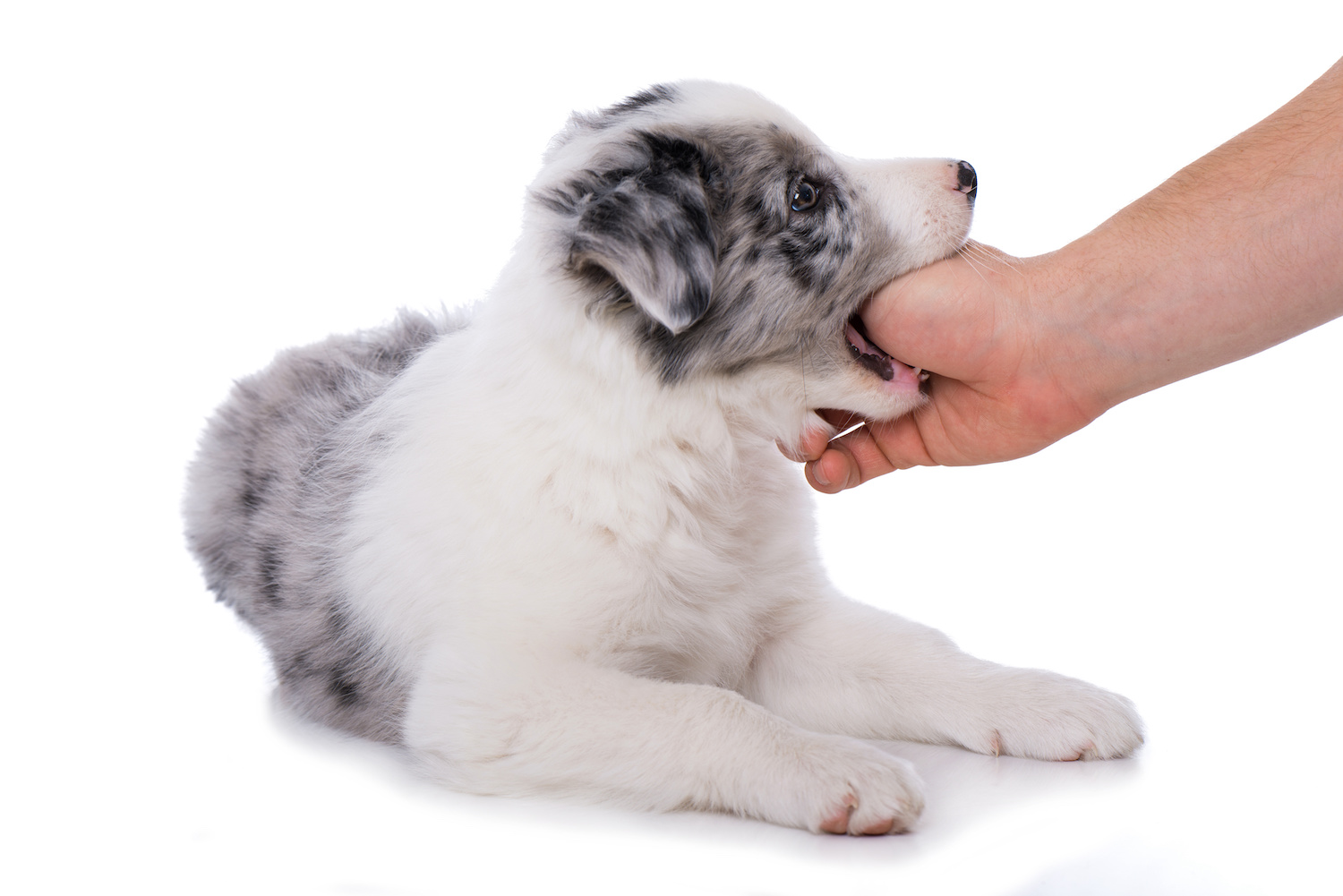
I’m often asked how long before a border collie puppy stops biting! People are disappointed and frustrated that their cute border collie puppy bites a LOT and makes everyone’s life difficult. It REALLY hurts and it’s disappointing that your cute puppy feels more like a monster. I’ve been there!!
It’s unfortunately a VERY common problem with collie pups. Some puppies are absolutely horrendous, and it’s really just a case of managing the behaviour rather than trying to stop it. Remember that it’s not personal, it doesn’t mean that they are bad, evil dogs, and you will still end up with a loving, fabulous dog once you get her through this stage. Play biting and exploring things with their teeth is a natural puppy behaviour – they explore everything with their teeth and if they’ve come from an environment where the puppies haven’t had much to do apart from play with each other, then it’s likely to be all she knows, and it wouldn’t be very fair to put too much pressure on her to stop it, as she’s just a baby.
Puppies tend to go through three main stages of biting:
- Baby teeth biting – from 8 to 16 weeks, a collie’s baby teeth are needle-sharp and they hurt, along with sharp little claws that haven’t had the chance to be worn down yet. This is often the worst stage of biting for new puppy owners.
- Teething – from 16 weeks to roughly 6 months the puppy’s teeth start to fall out and are replaced by adult teeth. This means that the teeth aren’t as sharp, but by now the puppy has more strength in their jaw and wants to chomp down on things to ease the pain of teething. So if they are still play biting at this stage, they can still cause injuries. It’s important to carefully monitor play between children and dogs to ensure that the dog isn’t get overexcited. Calm play with toys and without quick movements or running is the most likely to keep your puppy calm.
- Adolescent biting – from 6 months to 10/12 months puppies can still have quite persistent phases of getting over-aroused and biting their owners. This may be caused by over-excitement, frustration, anxiety, and inappropriate play: anything that makes them highly aroused can result in jumping and biting, and the more owners get angry and try to stop it, the worse it can get. It usually tends to be worse with the person that walks the dogs and feeds her the most. If your puppy is adolescent biting, then never leave your puppy and children unattended and ensure that play between them is always toy-focused and calm.
The best advice I can give anyone with a border collie puppy biting without booking a session and asking a lot more questions is to try and set up the environment for success, so that you don’t have to tell her off. It’s important to build a really good, positive relationship with her at this age, so try and think of things “outside the box” that would be more exciting than biting you. Lots of toys on ropes to pull around to distract her from hands onto toys, and really, really calm play. Don’t let anyone do any rough and tumble play with her. Keep hands still and all movements around her calm, and no running or fast walking. If the play biting during the first stage of baby teeth biting is really bad, buying everyone a pair of cheap wellies from Wilko might be a good option until her puppy teeth have fallen out!
Puppies play with their teeth because it’s fun and they very quickly learn that biting gets your attention. Teach them better ways to get attention. Reinforce any calm behaviour with treats, or with playing CALMLY with a toy. If they get too over-excited and bitey, leave the room for a few minutes or have the puppy on a house line and calmly pick up the line without saying anything and put them out of the room. It’s very important to be consistent with this. You may see articles recommending making a squealing or yelping noise that is supposed to stop the other dog from biting. This tends to make collies even more excited, because they tend to be quite noise sensitive, so I wouldn’t recommend this. Keep everything calm and quiet.
Sleep makes a huge difference. Enforce sleep routines – keep it the same every day so that her body gets into the sleep-wake cycle. Very young puppies need 20 hours of sleep a day, so don’t be afraid to give her time out somewhere calm and quiet if she’s getting too much. Being awake for an hour is plenty of time for a new puppy, so put them somewhere quiet to sleep as often as possible.
So, in answer to the question “How long before a border collie puppy stops biting?”, it could be up to 12 months. But if they are still biting past this age, please contact a behaviourist, as this isn’t normal and you will need support. If you are struggling with your puppy carrying out adolescent biting, or if these tips and the information in our blog post “training a border collie puppy not to bite” aren’t working, then it might be that there is something else going on, so please sign up for a training session. They cost £50 for a one-off session, or £140 for three. I’ll be able to help you and put your mind at rest. Contact me at collieconsultant@gmail.com.

